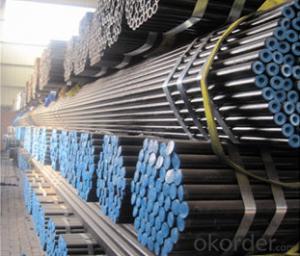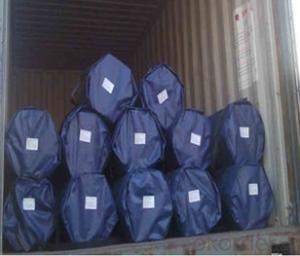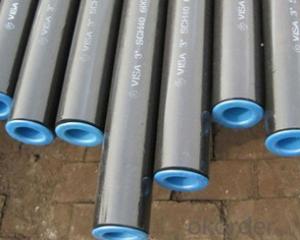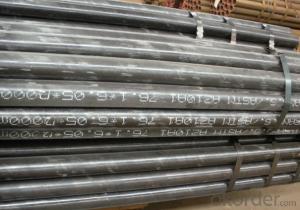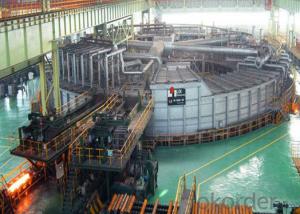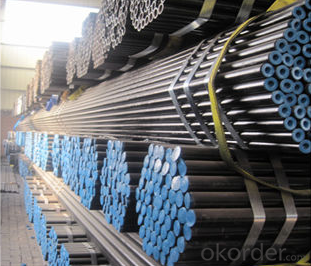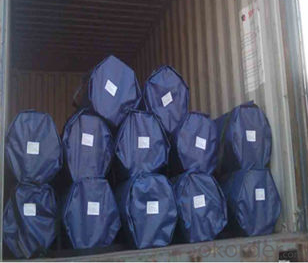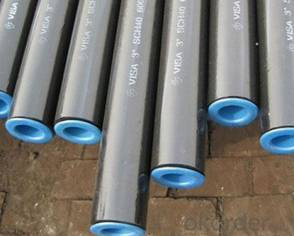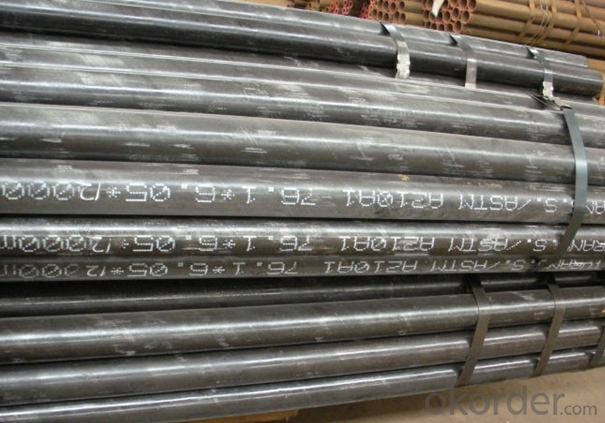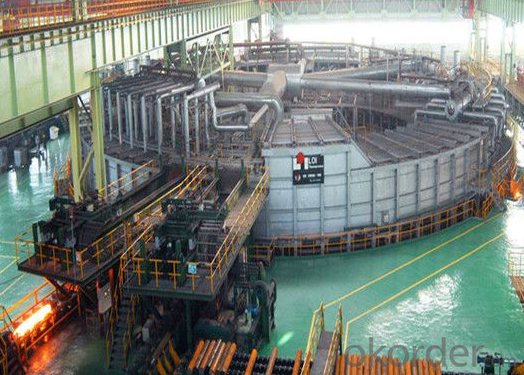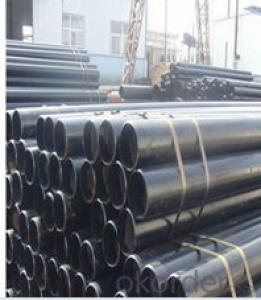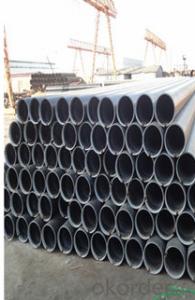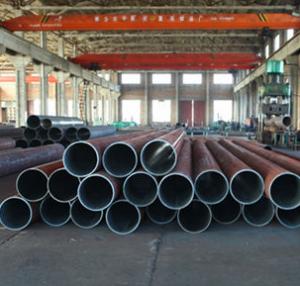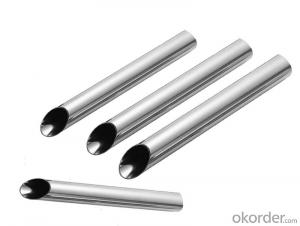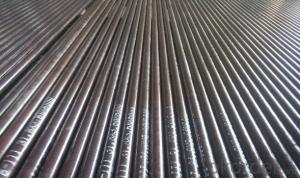High-quality Carbon Seamless Steel Pipe For Boiler Painted CNBM
- Loading Port:
- Qingdao
- Payment Terms:
- TT OR LC
- Min Order Qty:
- 10 pc
- Supply Capability:
- 30 pc/month
OKorder Service Pledge
OKorder Financial Service
You Might Also Like
Quick Details
| Thickness: | 3 - 60 mm | Section Shape: | Round | Outer Diameter: | 21.3 - 1220 mm |
| Secondary Or Not: | Non-secondary | Application: | fluid pipe,boiler pipe, structural pipe, oil/gas/water pipe etc | ||
| Technique: | Hot Rolled | Certification: | ISO9001-2000, ISO14000, ISO18000 , API 5L | Surface Treatment: | Painted, Oiled, galvanized or phosphate etc |
| Special Pipe: | API Pipe | Alloy Or Not: | Is Alloy | Technique:: | Hot rolled or cold rolled |
| Special pipe:: | API/ ASME/thickwall/oil/gas/water pipe | Length:: | 3-12m | Treatment of two ends:: | Beveled end , plain end etc |
| Brand:: | Bai Chuan | Third Party Inspection:: | BV, SGS etc. | Schedule:: | SCH10-SCH160, XS, XXS |
| Other Material:: | 10#, 20#, 16Mn, Q345 etc | Material Type:: | Carbon steel/ Low alloy steel | Producing standard:: | American/Japanese/ German/ Britain/ Chinese standard |
| Grade: | A53(A,B),A106(B,C),A210,API J55,St37,STPG42,A53-A369,API J55-API P110,ST35-ST52 | Standard: | BS EN10296,JIS G3452-2004 |
1. Out Diameter: | 21.3mm-1220mm |
2. Wall Thickness: | 3mm-60mm |
3. Length: | 3m-12m |
4. Producing Standard: |
|
5. Main Material: (Carbon Steel & Low Alloy steel) |
|
6. Special specifications: | Available according to customer’s requirements and quantity. |
7. End Shape: | Beveled end , plain end, varnished, or adding plastic caps to protect the two ends as per customer’s requirements. |
8. Surface treatment: | Painted, Oiled, galvanized, phosphate etc. |
9. Usage: |
|
10. Certificates: | ISO9001-2000, ISO14000, ISO18000, API 5L certificate |
11. Third party inspection: | Welcome you to send a third party inspecting company (BV, SGS etc) to check the quality of our final products. |
12. Pictures: | our producing flow chart, our factory, production line, inspecting equipments, our products are listed below for your reference. |
- Q: What does "steel pipe SC" mean?
- SC (run in welded steel duitconSC is the line laying mode GB letter of wire is worn steel pipe laying (welded steel pipe, low pressure fluid) SC70 said the conductor by low pressure fluid DN70 welded steel pipe as protection pipe laying, DN70 said the nominal pipe diameter is 70mm, the nominal pipe diameter is 70mm (a series of values, the actual diameter slightly different).
- Q: How are steel pipes used in the manufacturing of power plants?
- Steel pipes are extensively used in the manufacturing of power plants for various applications such as transporting water, steam, and other fluids, as well as for structural purposes. They are commonly used for the construction of boiler tubes, heat exchangers, condensers, and steam distribution systems. Additionally, steel pipes are essential for conveying fuel gases and air in power plants, ensuring efficient operation and safety.
- Q: How are steel pipes protected against soil movement?
- Steel pipes are protected against soil movement through the use of various measures such as proper installation techniques, trench stabilization, and the implementation of protective coatings. Additionally, the pipes may be anchored or encased in concrete to prevent movement or damage caused by shifting soil.
- Q: How are steel pipes used in the manufacturing of bicycles?
- Steel pipes are commonly used in the manufacturing of bicycles as they provide strength, durability, and rigidity to the frame structure. The pipes are typically used to construct the main frame, handlebars, seat post, and fork, ensuring a sturdy and reliable bicycle.
- Q: What are the different methods of insulation for steel pipes?
- There are several methods of insulating steel pipes, including applying a thermal insulation coating, using pipe wraps or jackets, using foam insulation, or utilizing heat shrink sleeves.
- Q: Can steel pipes be used for conveying slurries or abrasive materials?
- Indeed, the utilization of steel pipes proves effective in the conveyance of slurries or abrasive substances. Renowned for their robustness and endurance, steel pipes are aptly suited for the management of demanding tasks. They exhibit resistance against wear, corrosion, and impact, rendering them exceptionally suitable for transporting abrasive materials or slurries laden with solids or particles. Furthermore, steel pipes possess the ability to endure high pressure and retain their structural integrity, thereby guaranteeing the secure and efficient transportation of slurries or abrasive substances.
- Q: Can seamless steel pipe and ordinary steel pipe be welded?
- Steel pipe and seamless linking points, you said should refers to ordinary steel pipe joints, if only consider the butt welding problem, two kinds of steel can be welded. But the mechanical properties of the seamless steel pipe and tube with different, generally the main difference is the two kinds of steel can withstand the pressure of the former than the latter to be good.So if your project is seamed steel pipe can be, then the two pipe welding, welding and butt welding interface is completely no problem.
- Q: What is the difference between steel pipes and concrete-lined pipes?
- The main difference between steel pipes and concrete-lined pipes lies in their composition and protective features. Steel pipes are typically made entirely of steel, providing strength and durability. On the other hand, concrete-lined pipes consist of a steel pipe coated with a layer of concrete. This lining offers additional protection against corrosion and abrasion. While steel pipes are more suitable for high-pressure applications and offer better resistance to external factors, concrete-lined pipes are commonly used in wastewater systems to prevent corrosion and extend the lifespan of the pipe.
- Q: Where is a steel pipe casing usually used?
- A straight tube of carbon steel sheathed on pipes and tubes and threading tubes to protect the joints from damage by electric welding. The purpose is to protect the wires and cables.
- Q: What are the common grades of steel used in pipes?
- The common grades of steel used in pipes include ASTM A53, ASTM A106, and API 5L.
Send your message to us
High-quality Carbon Seamless Steel Pipe For Boiler Painted CNBM
- Loading Port:
- Qingdao
- Payment Terms:
- TT OR LC
- Min Order Qty:
- 10 pc
- Supply Capability:
- 30 pc/month
OKorder Service Pledge
OKorder Financial Service
Similar products
Hot products
Hot Searches
Related keywords
